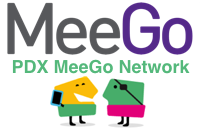 Big changes are coming my way in March. I will be joining Intel on March 1 as Intel’s community manager for the newly formed MeeGo open source community. MeeGo was formed out of a merging of the Moblin and Maemo communities, and I am really excited about the opportunity to work on this new project. As I dig into MeeGo and get more familiar with my specific role, I’ll post more details about exactly what I’ll be doing.
Big changes are coming my way in March. I will be joining Intel on March 1 as Intel’s community manager for the newly formed MeeGo open source community. MeeGo was formed out of a merging of the Moblin and Maemo communities, and I am really excited about the opportunity to work on this new project. As I dig into MeeGo and get more familiar with my specific role, I’ll post more details about exactly what I’ll be doing.
This is my second tour at Intel; I first worked at Intel from 2000 – 2006. At that time, I had never worked for a company with less than 20,000 employees. All of my work experience was in large corporations, but I had no startup experience. I left Intel specifically to spend a few years working in much smaller startups and to focus on roles where I would be building online communities. I worked in 2 startups, including Jive Software where I built and managed the Jivespace developer community. When I joined Jive, there were only 50 employees, and a year later when there were nearly 150 people, it started to feel less like a startup. At that point, I decided that it was time for me to break out on my own to do freelance consulting, which was something I had been wanting to do for a while. Freelancing was another first for me, since I had never owned my own business or done any outside consulting.
I have been consulting for almost 2 years, and there are parts of it that I love and parts that aren’t as awesome. I love working with clients to build communities and having copious amounts of flexibility in my schedule and working arrangements. However, I don’t enjoy doing business development, invoicing, and many of the other tedious business tasks. As a freelancer, I pay more in taxes and many things become much more complex, difficult and time consuming: health insurance, retirement savings, etc. There are also the inevitable ups and downs that cause plenty of stress when you are trying to line up that next gig to replace the one that is wrapping up.
The biggest challenge for me is one that sounds almost counter-intuitive, but it is the biggest issue that I have with my freelancing career. By becoming a freelancer, I took my hobbies and turned them into paying gigs. Sounds awesome, doesn’t it? Well, it was great … at first. Recently, I realized that many of the things that I used to do for fun now seemed like work, and they became less fun over time. All of a sudden, activities like blogging, attending events, speaking at events, and more felt like a big weight on my shoulders, since I needed to use these as ways to generate more business. They started to feel more like marketing and less like something that I was passionate about and doing for fun. All of a sudden, my hobbies had mostly disappeared, and I was spending all of my time doing things that felt like work, which has left me burned out. This is the primary reason that I recently decided to go back to corporate life.
I’ve been doing a bit of consulting at Intel, and I’ve enjoyed seeing some of the changes that have happened while I was gone. I’ll be joining the Open Source Technology Center, which has grown since I left, but I still have many friends working on open source at Intel, and I am eager to work with them again. I’ve also been really impressed with how other groups at Intel have embraced social efforts through the work of people like Josh Bancroft, Kelly Feller, Bryan Rhoads and many others.
I’m looking forward to working on MeeGo and am truly excited to be going back to Intel.
 I thought it would be fun to start to organize a monthly (or so) Portland MeeGo Meetup … because that’s what community managers do. 🙂
I thought it would be fun to start to organize a monthly (or so) Portland MeeGo Meetup … because that’s what community managers do. 🙂 One of the biggest challenges for any community manager is to find ways to get new members integrated into your existing community with all of its established norms and ways of working. This can be particularly difficult if many of the things that define your community aren’t clearly documented. For any community, having great documentation can solve so many potential issues and make it easy for both new and existing members to get the information that they need quickly and easily. Ideally, you can put all of this documentation in a wiki and enlist the help of other community members. In the
One of the biggest challenges for any community manager is to find ways to get new members integrated into your existing community with all of its established norms and ways of working. This can be particularly difficult if many of the things that define your community aren’t clearly documented. For any community, having great documentation can solve so many potential issues and make it easy for both new and existing members to get the information that they need quickly and easily. Ideally, you can put all of this documentation in a wiki and enlist the help of other community members. In the 